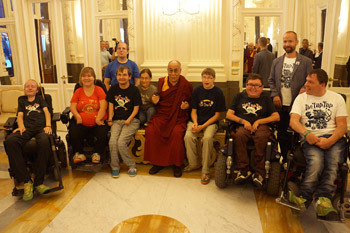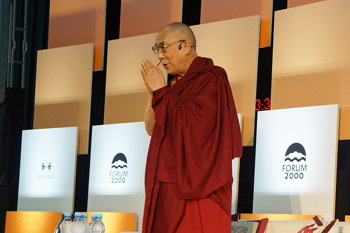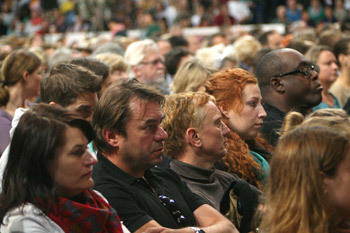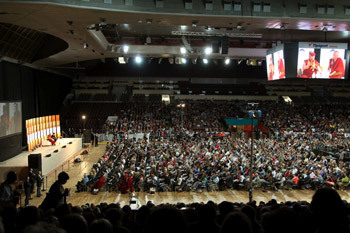Prague, Czech Republic, 14 September 2013 - This morning, after three days in Vilnius, Lithuania, His Holiness the Dalai Lama flew to Prague, capital of the Czech Republic. He was received at the Airport by Karel Schwarzenberg, former Foreign Minister in the Czech government and leader of the TOP 09 party, Tomas Hudecek, Mayor of Prague, and Executive Director of the Forum 2000 Foundation, Jakub Klepal. Arriving at his hotel, Tibetans from the Czech Republic, Hungary and Austria and Czech supporters of Tibet were gathered to welcome him.

|
His Holiness the Dalai Lama with a group of physically challenged young people who play music together on his arrival at the Tipsport Arena before the start of his talk in Prague, Czech Republic on September 14, 2013. Photo/Jeremy Russell/OHHDL
|
After lunch, he greeted a group of physically challenged Czechs who play music together as he was on his way to the Tipsport Arena, venue for his public talk. His first words from the stage, having greeted the audience of more than 6000, were in tribute to his late friend and founder of Forum 2000, President Vaclav Havel.
“He was a humble, genuinely good human being, who put on no airs. From the first he was honest and truthful. I visited him several times after our initial encounter and was one of the last to visit him before he passed away. Because of my friendship for him and others here, I have a special place in my heart for the Czech people. The day after tomorrow, I hope to visit his office to pay my respects although he is no longer physically with us, just as I once visited the home in Patna of Rajendra Prasad, First President of India after he too passed away. As I told Havel’s widow and those who knew and admired him, the best tribute we can pay him is to carry on his activities in his spirit.
“I have come to participate once more in Forum 2000, which was founded by President Havel and led by Oldrich Cerny, who has also sadly passed away since I was last here. I have just met his widow and was impressed by the warm smile rather than grief with which she greeted me.
“I am very happy to be here, to be able to talk to all of you like members of one family and I thank the organizers of this event for making it possible.”
His Holiness began his public talk in his customary way:
“We are all basically the same, mentally, physically and emotionally. We all want a happy life and have a right to achieve it. We have the same emotions, some are destructive, some are positive. I don’t think of myself as anything special; I think of myself as one of you.”
He elaborated that as human beings we are social animals. Like other creatures, ants and bees, for example, our survival depends on the rest of our community. Today’s reality is that the whole world is interdependent. Problems like climate change affect us all, ignoring boundaries. Because of climate change natural disasters are likely to occur, also, natural resources will become scarce and the gap between rich and poor continues to increase. These are challenges we have to face thinking of humanity as one family and working together as one.

|
His Holiness the Dalai Lama speaking during his talk at the Tipsport Arena in Prague, Czech Republic on September 14, 2013. Photo/Jeremy Russell/OHHDL
|
“Where humanity used to work together in ancient times we now rely on technological support and material values to the neglect of our human values.” His Holiness said, “I have participated in several conferences about the crisis in human society. At one, in San Francisco, the conclusion was that our difficulties derive from a general lack of human affection. Unfortunately, our education system is materialistically oriented and the influence of religion that used to be a source of moral values has declined. Many of those who continue to follow religion show little real dedication and are inclined to corruption and exploiting others.
“We need to introduce ethics into our education system, not based on faith but on reason. I meet all kinds of people in different parts of the world and it is clear to me that peace of mind is the key to living a happy life. I meet many who are materially successful, while remaining unhappy inside.”
He remarked that women who beautify themselves with cosmetics remind him that while external beauty is one thing, inner beauty is much more important. When a beautiful face wears an angry expression, the beauty is lost. Meanwhile, peace of mind makes for a happy family and a community will be happier if the families within it are peaceful and compassionate.
Occasionally anger may be positive if the motivation is good. Likewise a courageous person needs a strong sense of self; self-confidence is positive. But an over-emphasis on self and selfish concerns doesn’t help, whereas having a compassionate heart is always helpful.
His Holiness suggested that we need a map of our emotions to understand how our emotions work. No one enjoys anger, but everyone appreciates affection. Because warm-heartedness is positive, we need to develop a sense emotional hygiene. The code of ethics that can lead to this needs to be secular ethics. He clarified that when he uses the word ‘secular’ he does so in an Indian context, meaning respect for all religious traditions without bias. The men who contributed to drafting pluralistic India’s secular constitution after Independence - Gandhi, Dr Ambedkar and Dr Rajendra Prasad for example - were all personally religious men. Secular ethics is what is appropriate for our secular education system.

|
Some of the over 6,000 people attending His Holiness the Dalai Lama's talk at the Tipsport Arena in Prague, Czech Republic on September 14, 2013. Photo/Igor/SaveTibetRussia
|
“Many of our problems are our own creation. They derive from our self-centredness. But once we develop a greater concern for the well-being of others, there is no room for bullying, cheating and exploitation. All destructive human action derives from our destructive emotions. These need to be our target. On the other hand, genuine concern for others’ well-being is implicitly an expression of respect for them. If we can reduce our sense of self-centredness, we can reduce our destructive emotions.”
His Holiness reiterated that the essential teaching of all religions is love and once you develop love and affection, you naturally become respectful of others. The key factor is education; education that involves warm-heartedness and takes account of human values.
“If you find any of what I have said interesting,” His Holiness concluded, “please think about it and discuss it with others. Musicians can sing about warm-heartedness. Film-makers, instead of depicting sex and violence, can educate people about the value of simple warm-heartedness and respect for each other. However, if you find what the Dalai Lama says is stale and unrealistic, please, just forget it.”
Among questions from the audience, the first concerned how we know the decisions we take are correct. His Holiness recommended looking at the question not just from one angle, but from many angles. He also said that the mind should be very clear and that unless you take account of reality, your decision will be unrealistic and will fail to bring a result. To another question about fear he replied that there are two kinds of fear: fear with a practical basis like fear of a mad dog and fear that is largely our mental projection.

|
View of the Tipsport Arena, venue for His Holiness the Dalai Lama's over talk on Compassion & Respect in Today’s Society in Prague, Czech Republic on September 14, 2013. Photo/David Musil/Forum2000
|
Someone asked how to put compassion into action. His Holiness said compassion doesn’t just mean sitting still, it means getting up and doing something. Compassion brings energy and enthusiasm to act, but wisdom lends good judgement. Enthusiasm by itself is blind, but wisdom derived from analysing the situation coupled with an unbiased attitude give it direction.
As His Holiness thanked the audience with folded hands for coming to listen to him, they responded with smiling faces and sustained and warm applause. Tomorrow, he will give an explanation of a traditional Tibetan Buddhist text, the “Eight Verses of Training the Mind.”
















